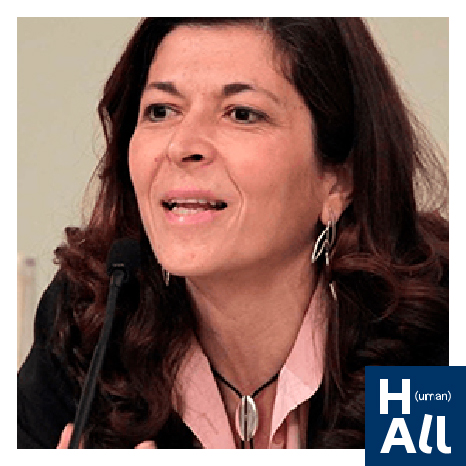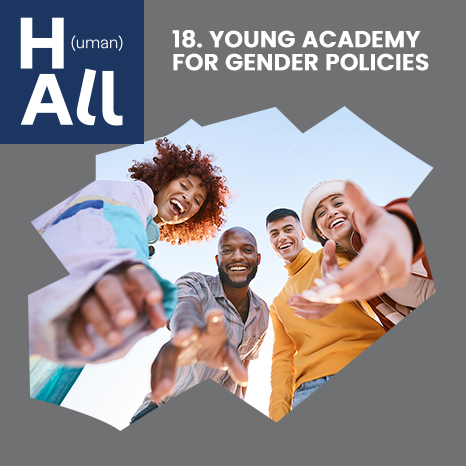Young Academy for Gender Policies - Generating a new gender culture
TEAM
WHAT WE DO
YOUNG ACADEMY FOR GENDER POLICIES
INTERVIEW WITH MARILISA D’AMICO – Pro-rector of the Third Mission and Equal Rights

Who does the Young Academy target?
The Young Academy for Gender Polices was set up to train young volunteers, aged 18-30, who want to dedicate themselves passionately to a concrete initiative to overcome the gender gap. Through this training, the volunteers will become trainers themselves, educating in return young students from secondary school on equal opportunities and inclusion. The pathway also aims to activate intergenerational networking to contribute to the personal, educational and professional development of the young men and women who chose to participate.
A project born from the collaboration between the university and businesses, to train young people and young volunteers: which direct impact do you hope to have on society?
We aim to support young men and women in building awareness of the topic covered during the lectures cycle to then bring them and disseminate idea, skills and new perspectives in the most varied context. Young volunteers, trained by researchers, will take their exam with students, starting a positive cycle of exchange and active training.
How was the training of young volunteers structured within the Young Academy for Gender Policies? And how innovative was the pathway?
The training consisted of five lessons of two hours each, with immersive and innovative teaching methods and the lectures ranged from the study of gender policies to their effectiveness in promoting equal opportunities. In particular, expertise on anti-discrimination law, gender-based violence, discriminatory language and discriminatory languagewas provided, as well as sexist advertising, labour law and pedagogical skills that helped activists to export what they had learnt also in peer-to-peer training.
What obstacles still need to be overcome when it comes to stereotypes and how can the Young Academy for Gender Policies help progress these battles?
Stereotypes are still real and it’s a long way to break them down: global data show the difficulty in achieving full and true gender equality. These are not superficial cognitive biases, but concepts deeply rooted in society and often stereotypes that are also conveyed through media and institutions. The lack of awareness of the impact of these stereotypes are for sure the biggest obstacle, as well as their prior recognition and the adoption of tools to counteract them. An integrated and multidisciplinary approach is the only tool that can bring us closer to tackling them in a more correct way.
Who does the Young Academy target?
The Young Academy for Gender Polices was set up to train young volunteers, aged 18-30, who want to dedicate themselves passionately to a concrete initiative to overcome the gender gap. Through this training, the volunteers will become trainers themselves, educating in return young students from secondary school on equal opportunities and inclusion. The pathway also aims to activate intergenerational networking to contribute to the personal, educational and professional development of the young men and women who chose to participate.
A project born from the collaboration between the university and businesses, to train young people and young volunteers: which direct impact do you hope to have on society?
We aim to support young men and women in building awareness of the topic covered during the lectures cycle to then bring them and disseminate idea, skills and new perspectives in the most varied context. Young volunteers, trained by researchers, will take their exam with students, starting a positive cycle of exchange and active training.
How was the training of young volunteers structured within the Young Academy for Gender Policies? And how innovative was the pathway?
The training consisted of five lessons of two hours each, with immersive and innovative teaching methods and the lectures ranged from the study of gender policies to their effectiveness in promoting equal opportunities. In particular, expertise on anti-discrimination law, gender-based violence, discriminatory language and discriminatory languagewas provided, as well as sexist advertising, labour law and pedagogical skills that helped activists to export what they had learnt also in peer-to-peer training.
What obstacles still need to be overcome when it comes to stereotypes and how can the Young Academy for Gender Policies help progress these battles?
Stereotypes are still real and it’s a long way to break them down: global data show the difficulty in achieving full and true gender equality. These are not superficial cognitive biases, but concepts deeply rooted in society and often stereotypes that are also conveyed through media and institutions. The lack of awareness of the impact of these stereotypes are for sure the biggest obstacle, as well as their prior recognition and the adoption of tools to counteract them. An integrated and multidisciplinary approach is the only tool that can bring us closer to tackling them in a more correct way.
PARTNERS
The first international, non-partisan, non-profit Think Tank founded and supported by leaders from: INSTITUTIONS – INTERNATIONAL HR LEADERSHIP ASSOCIATIONS – AIESEC.
HR WoMen is inspired by the UN and EU sponsored strategic framework (He for She): given the growing awareness that equal opportunities are a valued things for all, the cultural effort of men for the empowerment of women becomes necessary.
The community of managers and senior professionals. We represent managers, middle managers and executive professionals from Commerce, Transport, Tourism, Services and the Advanced Tertiary Sector. We value their role and contribution in the economy and society, we offer services for the profession, the individual and the family.
Paolo Ceravolo, Samira Maghool, Costanza Nardocci


















